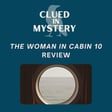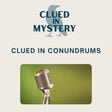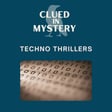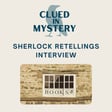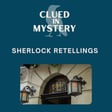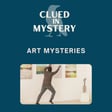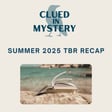Become a Creator today!Start creating today - Share your story with the world!
Start for free
00:00:00
00:00:01

Spy Fiction
Espionage, intrigue, and excitement. Brook and Sarah explore spy fiction and its broad appeal to audiences.
Our interview with Kings River Magazine.
ResearchCasino Royale, Ian Fleming
Trigger Mortis, Anthony Horowitz
Forever and a Day, Anthony Horowitz
Agent Running in the Field, John le Carre
QuotedHow to Write Killer Mystery, Carolyn Wheat
Genre favoritesImitation Game (2104) starring Benedict Cumberbatch, Keira Knightley
Allied (2016) starring Brad Pitt, Marion Cotillard
X Company (TV series based on true stories of a top secret spy training facility in Canada)
Slow Horses (TV series based on the book by Mick Herron on Apple TV)
The Rose Code, Kate Quinn
The Alice Network, Kate Quinn
Resourceshttps://crimereads.com/a-brief-history-of-spy-fiction/
Transcript
Introduction and First Interview Announcement
00:00:11
Speaker
Welcome to the Clued In Mystery podcast. I'm Sarah. And I'm Brooke. And we both love mystery. So Sarah, before we get started today, I wanted to share with our listeners a very special announcement. We had something fun and exciting happen. Sarah and I were interviewed as podcast hosts for the first time by Lori Lewis over at Kings River Life magazine.
00:00:35
Speaker
We'll link to the interview in case any of you would like to read it. That would make us happy. And I'll also remind you of Laurie Lewis' Mystery Rats Maze podcast. The episodes in that consist of mystery short stories and first chapters of mystery novels read and brought to life by professional narrators and actors. They're really, really good.
00:00:57
Speaker
You can find Mystery Rats Maze podcast on all your favorite listening apps or on their website, which is mysteryratsmaze.podbean.com.
Spy Fiction in Popular Media
00:01:08
Speaker
Thanks Brooke. So today we're going to talk about spy fiction and this was a really interesting topic for me to kind of think about into research.
00:01:20
Speaker
largely because I've watched far more in this genre than I've read. And I suspect that that's true for a lot of people. The Bond franchise is one of, I think it's the fifth highest grossing franchise of films ever. And I think I read somewhere or heard somewhere that something like one third of the world's population has seen a Bond film.
00:01:47
Speaker
Wow. I know. It's incredible. So everybody knows who James Bond is, right? But I suspect that the number of people who've actually read something by Ian Fleming or one of the other authors who write in the James Bond space is considerably lower. So maybe we can talk a little bit about that. But
00:02:05
Speaker
I'll start with just a little very high level introduction to spy fiction because again this is something that you know I'm not I'm not as familiar with but yeah we'll see how it goes.
Historical Evolution of Spy Fiction
00:02:21
Speaker
So as I was thinking about spies and spy fiction, I realized that the history is actually quite long. So if we think about a spy as someone who's gathering intelligence, Shakespeare and his plays frequently had characters who were eavesdropping or using what they heard to their advantage or to another character's advantage. And he had several female characters who would dress in a male part as part of a deception.
00:02:51
Speaker
So his plays weren't primarily what we would consider to be spy thrillers. I think they planted a lot of the seeds of what we see in that genre. Jumping ahead a few hundred years, 1821 saw the publication of The Spy, which was about the American Revolution.
00:03:09
Speaker
Richard Kipling's Kim was published serially starting in December 1900 and as a novel in 1901. And that brings us into the 20th century. Joseph Conrad's The Secret Agent proved also to be quite popular when it was published in 1907.
00:03:25
Speaker
And even our friend Sherlock Holmes played the role of spy in a few of Doyle's later works. But it's really only after the Second World War and into the Cold War that we see spy fiction taking off as being a popular genre.
Pro-Government Themes in Spy Fiction
00:03:40
Speaker
Spy fiction is rooted in conflict, and I think with the established news networks conveying information to the public far quicker during the Second World War than in past conflicts, it's not really surprising that the public became interested in espionage and its potential to impact the outcome of a conflict.
00:04:03
Speaker
And I think to some degree, spy fiction could be considered pro-government. So I wouldn't say that it's propaganda. I wouldn't go that far. But I would say that there's definitely a patriotic element to it that we don't see in Agatha Christie's works, though perhaps her patriotism is just less overt, because there's definitely a
00:04:26
Speaker
fondness for the English countryside that comes out in her writing. But in spy fiction, the protagonist, whether it's Bond,
00:04:38
Speaker
Jason Bourne, George Smiley. The protagonist is almost always working for the West with a big enemy looming. So in The Secret Agent, it was anarchy. It's the threat of nuclear war or communism in works from the mid 20th century. And more recently, it's global terrorists, criminal networks, or deep rooted conspiracy that they're working against.
00:05:05
Speaker
So the big names in the genre would be John Le Carre and Ian Fleming.
Influential Authors in Spy Fiction
00:05:13
Speaker
So John Le Carre wrote several works about George Smiley, as well as other characters who were part of the British Secret Service. And Ian Fleming obviously was the creator of James Bond,
00:05:27
Speaker
But that franchise is so popular that the Flemming estate has commissioned four other authors to continue writing Bond stories.
00:05:42
Speaker
But I thought, Brooke, maybe we could start by talking about how the mystery in spy fiction is as much about figuring out where allegiance lies as it is about understanding why characters make their choices and less about how a murder was committed or who didn't.
00:05:58
Speaker
Thank you so much for that, Sarah. That was fantastic. It was a great overview. But yeah, absolutely. The puzzle is different, isn't it? And actually, that question got me thinking about a book that was on my shelf.
00:06:14
Speaker
called How to Write Killer Fiction by Carolyn Wheat. And this is just a great book. It's primarily for people who are wanting to write mystery fiction. But she really draws a great comparison between
00:06:31
Speaker
mysteries, which she calls the fun house of mystery, or suspense, which she calls more of a roller coaster ride. I thought I'd share a quote because I think it's a great setup for this. So, Wheat says, in contrast to the intellectual pleasure of the mystery, suspense is an emotional roller coaster ride. If there is a puzzle element, it is decidedly secondary to the visceral experience.
00:06:55
Speaker
We read it not to be entertained by a detective sifting through the clues of a past murder, but to grit our teeth and bite our nails as our hero dodges bullets and evades danger in the present.
00:07:08
Speaker
So absolutely, we're not looking at a who done it. We're looking at maybe more of a who's doing it. Yeah. And so I, to prepare for this, read a couple of James Bond stories. And yeah, you definitely get that.
Bond vs. Le Carre: Styles and Changes
00:07:26
Speaker
Heart racing, is he going to get out of this situation that he's found himself in, right? He's either staring at the barrel of a gun, or there was
00:07:38
Speaker
threat of acid being thrown on him in one of the stories that I read. And I mean, you know that James Bond is always going to get out of it, but there's still that element of suspense.
00:07:56
Speaker
I've read a couple of things that kind of commented on the fact that James Bond particularly isn't so much a spy because he's rarely actually gathering intelligence, right? He's doing the action, right? He's saving the girl or coming up against someone in a physical altercation.
00:08:26
Speaker
Whereas in the Carre's work, it's far more rooted in talking to people and gathering information.
00:08:39
Speaker
Yeah, sure, Bond is an MI6 guy, but I think you're exactly right. Those stories are much more action-oriented, where La Carre's are much more intellectual. Like you really have to, that is one of, like you said at the beginning, my
00:09:00
Speaker
knowledge or background is mostly in the film or TV version of spy fiction. But the only exception is years ago I read The Spy Who Came in from the Cold. And it is something you have to read and be very diligent because there is so much information. It's very, like you say, intellectual. He's gathering lots of pieces of information. And Ian Fleming is just writing about the action pact.
00:09:29
Speaker
side of the of the adventure as the as I see it. And I think we see that in the film and television versions as well. Right. Like I think about but actually I think about James Bond like the earlier James Bond films.
00:09:45
Speaker
And I remember watching one with my husband, I don't remember which one it was now, but I remember turning to him at some point and being like, but nothing's happening. Comparing it to the Daniel Craig versions where it's like explosive scene after explosive scene. So, you know, I think that probably reflects a little bit shift in
00:10:06
Speaker
audience preference, but also special effects capabilities that are considerably more advanced and more elaborate than they were when Sean Connery was Bond. And so maybe those earlier Bond films are still closer to the spy fiction than being more action.
00:10:33
Speaker
action
Real-Life Espionage Influence on Fiction
00:10:34
Speaker
-driven. But if I think about, was it BBC that did The Night Manager a few years ago? I mean, there was some dangerous element in that, but it was really about gathering information.
00:10:50
Speaker
So one of the other things that I found fascinating was thinking about how many authors of spy fiction have a history of actually being spies themselves. So I don't know if his plays were necessarily about spies, but a contemporary of Shakespeare, Christopher Marlowe, was thought to have been a member of Francis Welsingham's
00:11:16
Speaker
extensive network of spies whose information was used to protect the interests of Queen Elizabeth I. And more recently, Graham Greene, who wrote The Quiet American, reported to the famous double agent Kim Philby, MI6,
00:11:33
Speaker
Uh, Ian Fleming, um, who we've already talked about, he worked for the, uh, did he work for MI5 or MI6? I can't remember. I think MI6 as well. I mean, there's a long history of, of authors writing about what they know, right? So, um, lawyers writing legal thrillers, um,
00:11:52
Speaker
pathologists writing mysteries that involve kind of figuring out the puzzle of what the body is telling them so that they can figure out what the crime was. But there's something, I don't know if it's because it feels like we as the audience are being let in on a secret that makes spies or authors who are spies just seem a little sexier. I don't know.
00:12:15
Speaker
What do you think, Brooke? Yeah. Well, and I also came across these names of authors who, Somerset Maugham was MI6 and CS Forrester was writing propaganda for the Ministry of Information. And it's even suspected by a recent biographer that Ernest Hemingway
00:12:37
Speaker
had set up a counterintelligence bureau in Havana for the FBI. But I think you're right because it gives the pros or the stories so much more weight if you know that they know what they're talking about. And that's true for anything we read. It makes it more impactful. But because this is such a fascinating and dangerous and tricky mission,
00:13:08
Speaker
And I also think that it's interesting because we kind of think of authors as like the little nerdy unassuming figure, but these guys were doing amazing and dangerous and, you know, exhilarating things and then coming back to write stories about it. So writers aren't always the wallflower.
00:13:32
Speaker
So one of the things, just thinking about spies being authors as well, is one of the things I read, I think it was Graham Greene, wrote something that was used by other intelligence services to understand how the British Secret Service worked. So I guess that's the risk in this,
00:13:59
Speaker
author being also a spy is them sharing a little bit more than they should, which isn't so much a risk if it's a lawyer or a physician writing about murder from their perspective. I have to look it up and find the reference to include in the show notes.
00:14:23
Speaker
Yeah, that's so interesting. I mean, the risk you take in, you know, spilling the tea about MI6, uh, that's, that's a dangerous game. Yeah. You would, you would really have to be careful about not revealing too much about, I guess, the, the trade craft, right? In terms of, um, what they do to for, um, transfer information. So the dead drops or, um, I was trying to remember which.
00:14:53
Speaker
whether it was something that I read or something that I watched where messages were passed through the spines of books.
00:15:02
Speaker
Yeah, and so there was a bookshop that kind of served as that location and the conversation happened through the messages that were in the spines of books. I'm going to have to see if I can figure out, maybe I have to go to the library because I'm sure the librarian will know exactly what I'm talking about.
00:15:25
Speaker
That just excites a book lover so much that that's the way that the codes were passed. That makes me so happy. Totally, totally. But the challenge would be if you've used that in your book, they can't continue to use that method, right? If that was how they were actually, if that was ever
00:15:50
Speaker
based in truth. And obviously James Bond has all of his gadgets that may or may not actually exist. And so there's probably less risk with those stories. But when you think about Graham Green or Lacare and the stories that were more grounded in the gathering of intelligence,
00:16:12
Speaker
that caution. I imagine that there might have been some people higher up at MI6 who were reading some of their stories with a little bit of unease.
European Settings and Gender Roles in Spy Fiction
00:16:28
Speaker
For sure.
00:16:30
Speaker
One of the other things that I was thinking about is location. So in past episodes, we've talked about how classic mysteries really, we associate those with the UK. And hard-boiled mysteries, we associate with the US. They're set in urban settings in the US.
00:16:55
Speaker
much of what I read for our conversation was either said in the UK or featured British spies, right? So again, we're talking about Bond, La Carre. Did you read anything that featured American
00:17:13
Speaker
Spies, I mean, I know there's more there must be some that are that are set with CIA or American intelligence and I know there's definitely television shows that are based on The CIA, you know homeland and then I was alias It wasn't CIA. It was like its own private Like a fictional but it was based in the US. Yeah
00:17:41
Speaker
Um, but yeah, did you like, I don't, I don't have any comparison. Do you, have you read any, anything featuring American spies? No, everything. Um, like you say, it's all very UK based. And, uh, like even if you think about the Jason Bourne franchise, I believe he's an American spy, but it all mostly takes place in Europe. So there's some.
00:18:07
Speaker
Like sexy intrigue I think with the European and I really believe that it probably comes back to the fact that It the popularity of it arose From those years like you said and with British authors because it's it also is a very like the Golden Age It's gonna be a very British feel to almost all the you know, the cars are European cars and
00:18:32
Speaker
And the locations are a lot of the very luxurious European locations. So yeah, that's fascinating. So the other thing that I noted is the role of women in spy fiction.
00:18:49
Speaker
I've read recently a few books that women are the central characters, and they are playing a significant role in gathering intelligence. So I'm thinking of The Alice Network or The Rose Code, both by Kate Quinn. On TV a few years ago, there was a series called The Bletchley Circle about women who were involved in code breaking at Bletchley Park.
00:19:19
Speaker
But in, again, coming back to Bond and even Le Carre, women seem to really take a secondary role. And I think when I contrast that with mystery, especially cozy mysteries where women are very well represented as sleuths, I wonder again if that comes back to Fleming and Le Carre being the real masters of this space and them really setting that tone. What do you think, Brooke?
00:19:46
Speaker
I saw a large similarity between, and again, I'm talking about Lacquere and Fleming as well, a big similarity with the noir fiction women.
00:20:02
Speaker
Women sort of as the sex symbol sort of as the problematic femme fatale or the Women that they're not sure they can trust it felt a lot like the noir fiction and how we discussed that with Francis But you're right because there are then more contemporary shows where women are do have a lot of agency and are
00:20:26
Speaker
involved in this in the work themselves. I will say I read Trigger Mortis, which is Horowitz's first Bond book, I believe, since he took over writing those novels. And he is carrying on like the maybe the noir feature of women in that book. He it definitely feels like a Fleming novel. Fantastic, by the way. I really enjoyed that one.
00:20:54
Speaker
Yeah, I read Forever and a Day, which is another of Horowitz's Bond novels. And yeah, it did definitely feel like he had, well, he'd done what he'd been assigned, right? Like he continued in the Bond tradition. And, you know, I don't know how the audience would react if he wasn't this suave guy who managed to, you know, romance all the women that he encountered.
00:21:23
Speaker
Right. It just wouldn't feel like Bond if that was if that was what was happening. Exactly. Exactly. Alias was definitely, you know, a very strong female character doing spy like things. And then Homeland was also the main character and that was was a female. So there are definitely some more recent examples of
00:21:51
Speaker
women taking a more active role because I'm sure that the various spy agencies around the world would have both women and men working for them. So you would expect the fiction to reflect that.
00:22:08
Speaker
Right. And I think just like we talked about utilizing some of the unassuming characters of authors as spies, certainly that was happening with using women in general because it was taking advantage of the fact that people wouldn't think that of a woman, right? So I think that Bletchley and some of those shows that are set in
00:22:33
Speaker
the 40s or post-World War II are very accurate in the fact that I bet a lot of women were being contacted to do these sorts of things because people wouldn't suspect them.
00:22:47
Speaker
Well, people wouldn't suspect them, and the men were actively fighting, right? And so that meant that the women were kind of the only ones left behind. And so that was the role that they got to play. But yeah, I love those pieces of historical fiction where they kind of talk about that really important role that women were playing.
00:23:15
Speaker
in the Second World War. And even the Alice Network is about the First World War as well. And I really enjoyed that and the Rose Code and would highly recommend those to anybody who is interested in learning a little bit more from a fictional perspective of what was happening and what role women were playing. Absolutely.
00:23:42
Speaker
Brooke, those were kind of all the observations that I had about the spy fiction genre. Was there anything else that you wanted to comment on?
Philosophical Themes in Spy Fiction
00:23:53
Speaker
Yeah, I actually want to take this to a little deeper level, if you'll indulge me. I want to look at it sort of from a literary perspective. Spies ask these deep questions. A lot of times they're asking, who am I?
00:24:10
Speaker
Who's in charge? What's my mission here? What's the point? Who can I trust? And it's sort of the human condition questions. Jason Bourne, and I've referred to that again. It's one of my favorite
00:24:26
Speaker
spy trilogies is a really good example of this because he literally doesn't remember his life before. He doesn't know who he is. And I don't think it's too deep to think of spy fiction in that way. I think that all literature, even pulp or commercial fiction,
00:24:46
Speaker
It reflects the questions that we all experience as humans. And even though something's very entertaining, it can also be thought provoking. And it doesn't have to be. That's the fun thing about a lot of commercial fiction is you can just enjoy it for the ride. But you can also think about what the story is saying on a deeper level. And I really think spy fiction touches on some of those, you know, who am I? What's the point?
00:25:12
Speaker
That's such a great point, Brooke. And you definitely, I mean, I definitely saw that in what I've read of the Carre's work.
Personal Favorites and Recommendations
00:25:22
Speaker
I actually read or listened to one of the last books that he wrote, and he actually narrated it, which I thought was really, really neat to listen to him reading his work. Yeah, I thought it was excellent.
00:25:42
Speaker
And I think even Bond, he asks those questions. Certainly, I think Daniel Craig's Bond is, if you look at his arc, I think he's been asking some of those deeper questions about why am I doing this, right? Yeah. Why am I here? Who's in charge of me? Yeah, I think that's a really great point, Brooke. Thanks.
00:26:11
Speaker
So thanks for that conversation, Brooke. It was really interesting to kind of think a little bit more about spy fiction. I think I was a little bit concerned because I hadn't read very much of it. But when I think about how much, I really enjoy watching spy films and spy television programs. And I could rattle off a whole bunch to recommend to people. I think the one that we watched most recently was Slow Horses.
00:26:38
Speaker
It was on Apple TV and it was fantastic. I really liked that. But yeah, there's loads. Maybe we'll put some into the show notes, some of our recommendations. But yeah, thanks for this conversation, Brooke. Thanks. I agree. Let's put some recommendations in the show notes. But for today, thank you for joining us on Clued in Mystery. I'm Brooke. And I'm Sarah. And we both love mystery.
00:27:07
Speaker
Clued in Mystery is produced by Brooke Peterson and Sarah M. Stephen. Music is by Shane Ivers at silvermansound.com. Visit us online at cluedinmystery.com or social media at Clued in Mystery. If you liked what you heard, please consider subscribing, leaving a review, or telling your friends.
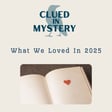
![[Re-release] Anthony Berkeley image](https://media.zencastr.com/cdn-cgi/image/width=112,quality=85/image-files/61e1c276e3ec42007857cff9/e7c778ac-a2ba-4809-9a5c-7cd39d167834.jpg)
![[Bonus] Wake Up Dead Man image](https://media.zencastr.com/cdn-cgi/image/width=112,quality=85/image-files/61e1c276e3ec42007857cff9/e276ac32-e664-464f-956c-7699bdb60aa5.jpg)
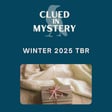
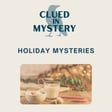
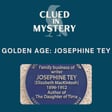
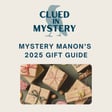
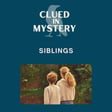

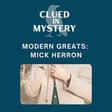
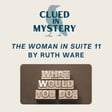
![[Bonus] Read Along: Daughter of Time image](https://media.zencastr.com/cdn-cgi/image/width=112,quality=85/image-files/61e1c276e3ec42007857cff9/b953ad72-c43e-48ca-a18a-b3c216ab90ee.jpg)
